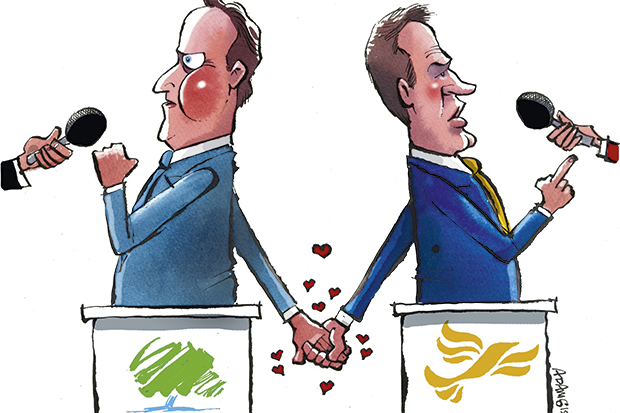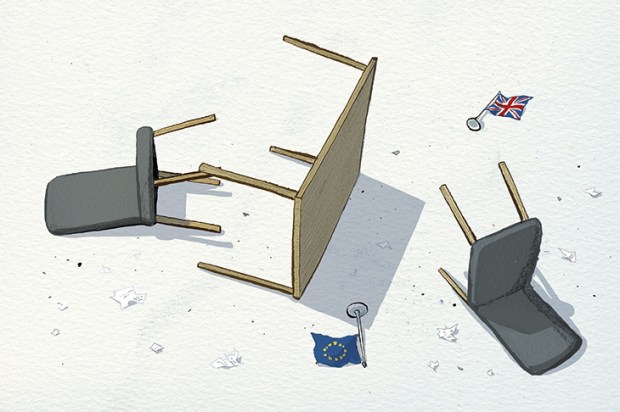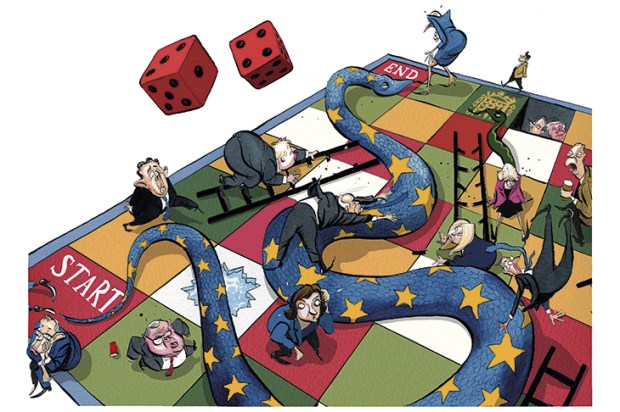David Cameron is honest to a fault — or so he told us this week. While cooking lunch in the kitchen of his Oxfordshire home, he was asked, in terms, whether this is the last election he’ll fight as party leader. Yes, he said, it was. He was then kind enough to name three potential successors. And when shortly afterwards broadcast journalists grew greatly excited by this, he said he had done nothing more than give a ‘very straight answer to a very straight question’.
But there is another question to which he will not give a straight answer: is he preparing for another coalition? The Prime Minister knows the official response: of course not, he’s fighting for a majority. He is adamant that no one on his team is planning for a hung parliament, and he won’t even discuss the matter because he wants to win outright. But behind closed doors, he doesn’t bother to maintain the fiction. In private, what the Prime Minister discusses is his plans for the next coalition deal.

The Spectator knows of at least two detailed discussions that Cameron has had on the topic in recent weeks. He said the same in both: no matter what they might hear to the contrary, he does not want to run a minority government. In the likely event of another hung parliament, he would prefer coalition. So the outcome of the general election will be decided by two battles: one at the ballot box, and the other behind closed doors — away from (and, in some cases, running contrary to) what was said on the campaign trail.
For all of their public protestations, the top of the Tory party is increasingly operating on the assumption that, yet again, they won’t win. Even one loyal secretary of state admits, ‘No one thinks we’re going to come back with a 30- or 40-seat majority.’ Instead, cabinet ministers expect the Tories to have the most seats but still be well short of the magic 326 mark.
Senior Tories used to be very bullish about the prospects of running a minority government. Two weeks ago, one cabinet member said there was a 50/50 chance of them doing so. As recently as last autumn, this seemed to be the preferred option. One No. 10 figure used to talk about the ‘eff off number’, the point at which the Tories could hope to rule without the support of the Liberal Democrats. While Cameron has been quite comfortable with the coalition he created, other Tories are not. Having a Tory-only government would mean more ministerial jobs to go round, and would foster party unity as Cameron took on all comers in the Commons and his MPs rallied to him.
But such optimism has faded in recent months. Those around the Prime Minister have now started to emphasise how tricky minority government would be.
George Osborne likes to say that the first rule of politics is knowing how to count — and according to Stephen Fisher, an Oxford academic, there is only a 9 per cent chance of the Tories winning 326 seats or more. One Cameron ally sums up the coalition question thus: ‘It’s the arithmetic for us: we’ll avoid it if we can and we’ll do it if we must.’ But this poses a problem for Cameron. How will he persuade his MPs — who will have a vote on the matter — to support another coalition?
One of the Prime Minister’s most trusted lieutenants explained to me recently that the best way is to present Tory MPs with a choice between coalition and opposition. Many of them would prefer minority government, so that option must be taken off the table. If the only choices were defeat or the Lib Dems, the theory goes, the Tory survival instinct would kick in and a second coalition would be approved. Cameron used a similar technique in 2010, warning his party that if they didn’t agree to a referendum on the alternative vote, Nick Clegg would do a deal with Labour and the Tories would be shut out of Downing Street. (He was exaggerating, and some Tories have never quite forgiven him for it.)
For the first time in living memory, the main parties have gone into an election expecting an indeterminate result, and thus expecting to cut deals with other parties afterwards. In 2010, the Tories only held their first serious meeting about what to do if they didn’t win a majority after the first televised debate and the brief period of Cleggmania that followed. Now, though, the prospect of another coalition is on Downing Street’s mind even before the campaign proper has begun — and privately it is viewed as the most likely route back to power.
Senior Tories were delighted that they and the Liberal Democrats were still able to present a joint Budget with only 50 days to go to polling day. With some justification, they saw it as proof that the two party leaderships can still work together. Afterwards, one of those involved in the Budget negotiations remarked to me, with a distinct sense of satisfaction, that ‘There is definitely another coalition to be done.’
The coalition’s last cabinet meeting this week was more au revoir than adieu. Tory ministers listened respectfully as Clegg paid tribute to how they had proved the doubters wrong and proved that coalition governments could work. One of those present describes the occasion as ‘a bit of a love-in’.
Lynton Crosby, the Tories’ forceful campaign director, loathes all of this. Ever since taking on the job, he’s been adamant that voters don’t like coalitions and don’t want another. The ‘competence versus chaos’ theme that Crosby and his business partner Mark Textor have instructed the Tories to deploy is designed to contrast a Cameron majority government with the uncertainty of another hung parliament. So any Tory minister or MP who started speculating about another deal with the Liberal Democrats would be ordered by Crosby, with all the adjectives at his disposal, to stop being ‘Colin the commentator’.
Crosby believes that even thinking that you’re heading for coalition can weaken a party: you can’t win by aiming for a draw. As the saying goes: if you shoot for the moon, you might get New York, but if you aim for Barnsley, you’ll get nowt. Boris Johnson, whose two successful London mayoral campaigns were both run by Crosby, seems to agree. He recently declared that the Tories ‘should say “stuff coalition with anyone”’. He warned that the prospect of post-election deals meant that ‘people don’t know what they are voting for’: ‘If we go into this thing issuing faint pheremonal offerings or mating signals to this or that party, it would be absolutely fatal.’
When it comes to campaign strategy, Crosby’s word is pretty much law. But he has far less influence on what happens when the polls close. On that, Cameron is determined not to bind his own hands. When the Tories were in the doldrums a few years ago, his staff were asked to come up with ideas. When it was put to him that he might rule out a second coalition, Cameron dismissed the proposal out of hand. It would be preposterous, he said, to close down one of his most likely routes back into No. 10.
There will be no dramatic last-minute pledge from Cameron not to cut any deals. Indeed, it seems that the Tory leadership is even considering the possibility of a minority or three-party coalition. One of those who has been involved in these discussions says No. 10 ‘underestimates how difficult a minority coalition or a triple coalition which just takes you over the line would be’.
Cameron will spend the next six weeks barnstorming his way across the country, declaring that he’s aiming for a majority. But, in the back of his mind, he’ll be thinking about something else: how he will do that second coalition, how he will lure Nick Clegg and the Liberal Democrats back into the No. 10 rose garden — and how will he sell it to his party?
Got something to add? Join the discussion and comment below.
Get 10 issues for just $10
Subscribe to The Spectator Australia today for the next 10 magazine issues, plus full online access, for just $10.
You might disagree with half of it, but you’ll enjoy reading all of it. Try your first month for free, then just $2 a week for the remainder of your first year.















Comments
Don't miss out
Join the conversation with other Spectator Australia readers. Subscribe to leave a comment.
SUBSCRIBEAlready a subscriber? Log in